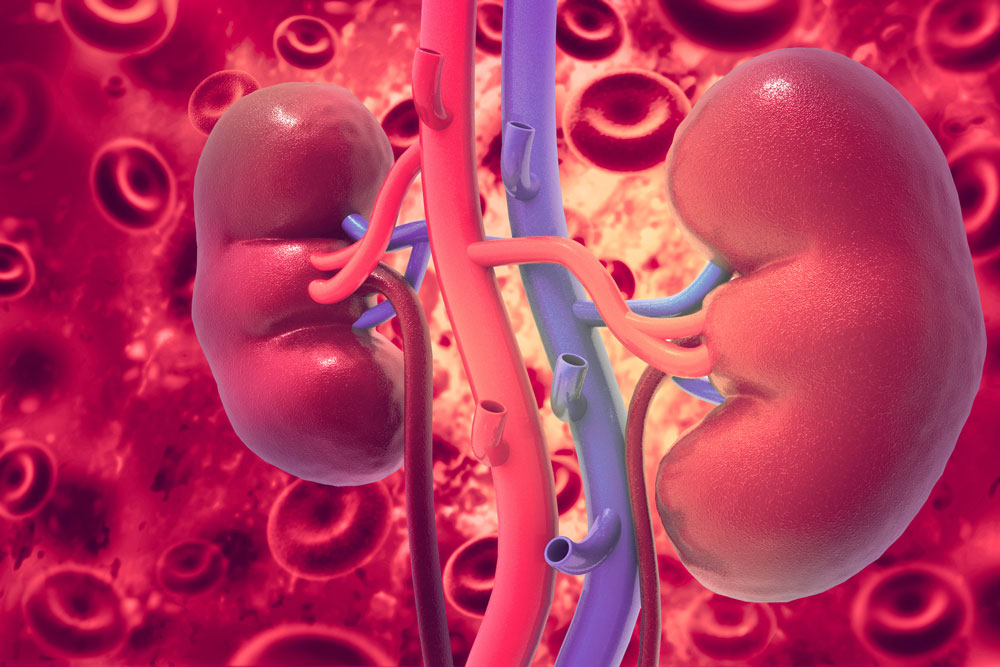
Kidney failure happens when your kidneys lose 85% to 90% of their function. Does that immediately make it a death sentence? No, it doesn’t. There are people who’ve dealt with a failing kidney and they’re still around living active lifestyles. How is it possible?
First of all, you have two kidneys in your body. If one fails, you still have another. Second, there are treatments that you can use to take over the work that your failing kidneys cannot do. To understand the gravity of your kidneys failing, let’s look at a few important facts about your body.
The important role of your kidneys
Your kidneys are located in your abdominal area. It’s towards the back of your body, on either side of your spine. Basically, your kidneys play an important role in cleansing your body.
- It filters the blood in your system to remove toxic waste products.
- It balances your body’s electrolyte levels.
- It controls your blood pressure.
- It stimulates a healthy production of red blood cells.
How does it happen? The blood that comes from the heart into the aorta then goes through the renal arteries to enter your kidney.
Inside, the cells in your kidney use sensors to regulate the amount of water and electrolytes to excrete. Whatever is excreted becomes urine and goes to your bladder. This is why when you’re dehydrated, your urine appears dark because it is concentrated. That’s because the hormone in your kidney called “renin” decided to hold on to the water to keep your body hydrated.
Once your kidney removes all the toxic waste products, the cleansed blood goes out via the renal veins. It then travels through the inferior vena cava to enter your heart.
Apart from that, your kidneys also produce the hormone erythropoietin. It’s the hormone responsible for stimulating the bone marrow to produce red blood cells. Your kidneys monitor the oxygen levels in the blood that passes through it. When that level falls, the erythropoietin production rises to create more red blood cells.
As you can see, your kidneys have a huge contribution to making sure your body is healthy and functional at the same time. This is why kidney failure should be a cause for concern. When your kidney loses its function, there’s no way for you to reverse it.
Vitamin D deficiency and Hyperparathyroidism
When you’re trying to learn more about chronic kidney failure, you’ll most likely encounter Vitamin D deficiency and Hyperparathyroidism (HPT) in the process.
What is the connection?
According to the Centers for Disease Control and Prevention, more than one-half of Americans are Vitamin D deficient.
Guess what organ plays an important role in converting Vitamin D to be used by the body? Your kidneys.
It’s responsible for absorbing Vitamin D that comes from the Sun or your food/supplement intake. Your kidneys convert it into an active form so your body can use it for enrichment. So, if your kidneys are failing, they won’t be able to convert Vitamin D. There will be low levels of Vitamin D in your system.
Now, when you have Vitamin D deficiency, your body is unable to absorb the calcium that it needs. Once your body detects that – it could lead to Hyperparathyroidism (HPT). This is a condition where any one of your 4 parathyroid glands fails to monitor the exact calcium levels in your body. These glands are responsible for the production of parathyroid hormones (PTH) that in turn, regulates the calcium levels in your body. These hormones are responsible for compensating for low levels of calcium in the blood.
If the Vitamin D deficiency leads to low calcium absorption, the parathyroid glands produce excessive amounts of the PTH – causing your calcium levels to shoot up.
This can lead to kidney stones that can result in further kidney failure.
What happens when your kidneys fail
There are several signs that indicate kidney failure. Since your kidneys primarily remove water and waste products, having it fail means you’ll have a build-up of extra fluid in your blood. This can make you sick. Among the symptoms you’ll have include:
- Anemia (having a low blood count)
- Itching
- Muscle cramps (specifically legs)
- Nausea
- Poor appetite
- Swelling of feet and ankles
- Tiredness
- Trouble sleeping
- Weakness
- Weight loss
How do you get rid of these symptoms? You have to start treatments for your kidneys.
Two ways to treat kidney failure
Here’s the truth. When your kidney fails, there’s no reversing it. There’s no treatment that can save it.
But as mentioned, it’s not a death sentence. There are two effective treatments for kidney failure. Either one of these will assume the role that the failed kidney can no longer do.
Dialysis
There are two types of dialysis. The first is hemodialysis. This treatment makes your blood go through a filter that will remove waste products before it’s sent back to your body. This is done in a dialysis center 3x a week Each treatment lasts for 3 to 4 hours. This procedure can be performed at home nowadays with proper training and generally requires a shorter duration, 4 to 5 times a week.
The other dialysis option is peritoneal dialysis. This involves placing fluid into your abdomen via a catheter that is inserted by a surgeon into the abdomen. The fluid captures the waste product in your blood. Once it’s done, the fluid is drained. Then a fresh bag of fluid is dripped back into the abdomen to repeat the cycle. Because of this process, you can do this yourself in the comfort of your home.
If you use ambulatory peritoneal dialysis (CAPD), you need to change your fluid up to 4 times each day. If you use a continuous cycling peritoneal dialysis (CCPD), this is performed at night with a machine. The fluid in your abdomen gets drained and refilled automatically.
Kidney transplant
Another way to treat kidney failure is through a transplant. There are many ways to get a donated kidney. One is through an anonymous donor – who may or may not have passed away. A relative is another candidate for a kidney transplant.
No matter where it comes from what’s more important is that the kidney matches your body. Otherwise, your immune system might reject it – making the transplant a failure.
You see, your immune system attacks anything that it deems is “foreign” in your body. If the kidney is a match, your immune system won’t consider it “foreign.”
When a transplant is completed, you’ll be given a special drug to confuse your immune system. That way, it won’t make your body reject the new kidney.
Why do kidneys fail
Kidney failure is known as Chronic Kidney Disease (CKD). Kidney.org reveals that an estimate of 37 million Americans has CKD. 75% of those diagnosed are caused by a primary condition of either diabetes or high blood pressure. Because of this, it can be assumed that 1 out of 3 Americans are at risk of having CKD.
But kidney disease isn’t the only reason for your kidneys to fail. It can also be damaged because of a physical injury.
Unless caused by an accident or physical injury, kidney failure doesn’t happen overnight. It’s a gradual loss of function. Sometimes, it happens so slow that people don’t even know they’re already in the early stages of kidney disease. When the symptoms finally appear, the disease has already spread. This is why you need to pay attention to your body and take very good care of it. Don’t ignore the small signs that it’s sending you.
Prevention is the key
If you want to avoid kidney failure, early detection is the key. You need to know if you have CKD. The good news is, the tests to confirm if you have chronic kidney disease are simple and inexpensive.
One test checks your blood sample to measure the glomerular filtration rate (GFR) or your kidney function by checking your serum creatinine and calculating your estimated kidney function based on that. This testing will show how your kidneys fare in removing the waste products from your blood.
Another test involves a simple urine test to measure the albumin-creatinine ratio (ACR) or the amount of protein being leaked into your urine. When your kidneys are damaged, it will leak protein; it will show up in your urine.
Once it’s confirmed, you may be given medication by your physician or advised to change your diet or lifestyle. Make sure you follow the prescribed plan. Also, make an effort to take care of your body. There are food and drinks that can aggravate and damage your kidneys.
A healthy lifestyle and low-protein diet, controlled blood pressure and glucose, plus monitoring your cholesterol intake will help minimize the dangers of kidney failure.
Talk to a specialist today
If you notice any one of the symptoms above, or you have a history of diabetes and high blood pressure, don’t ignore the signs.
At South Texas Renal Care Group, we specialize in treating your kidneys to maintain it’s functionality. We’ll educate you about your health and how you can avoid kidney failure.
Do you need assistance? Please give us a call at (210) 212-8622. We can schedule an appointment with one of our specialists to talk about your concerns.
